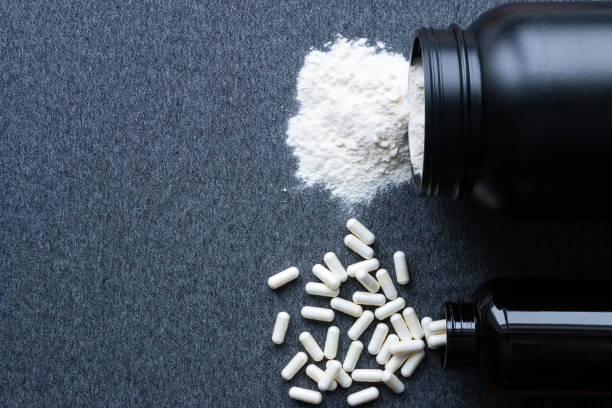What Does Creatine Do to the Body?
What Does Creatine Do? Exploring the Science Behind This Popular Supplement
Creatine is a widely-used supplement known for its benefits in muscle growth and strength.
This article explains what creatine does, why it works, and its potential benefits and risks.
Whether you are an athlete, bodybuilder, or fitness enthusiast, understanding creatine can help you decide if it’s right for your goals.
Outline
- What Is Creatine?
- How Does Creatine Work in the Body?
- What Are the Benefits of Creatine?
- How to Take Creatine Safely
- Creatine and Muscle Growth
- Types of Creatine Supplements
- Creatine for Women: Is It Effective?
- Potential Side Effects of Creatine
- Research on Creatine and Brain Health
- Summary: Key Points About Creatine
What Is Creatine?
Creatine is a natural compound found in foods like meat and fish. It is also produced by the body from amino acids.
Creatine is stored primarily in skeletal muscle as creatine phosphate, where it helps produce energy for high-intensity activities.
To learn more about foods that naturally contain creatine, check out this guide on creatine-containing foods.
Key Points:
- Creatine is a natural substance.
- Most of the body’s creatine is stored in muscle cells.
How Does Creatine Work in the Body?
Creatine enhances energy production during short bursts of intense exercise. When you take creatine, it increases the levels of phosphocreatine in your muscles.
This allows for quicker ATP (adenosine triphosphate) regeneration, which fuels muscle contractions.
For a deeper dive into how creatine works, visit this article on the science of creatine.
Key Points:
- Creatine phosphate replenishes ATP.
- It supports high-intensity activities like weightlifting and sprinting.
What Are the Benefits of Creatine?
Increased Muscle Mass and Strength
Creatine is proven to help increase muscle mass and strength.
Studies suggest that creatine supplementation enhances resistance training results by boosting energy and recovery.
If you're curious about how long it takes to see results, read this detailed guide.
Improved Athletic Performance
Many athletes take creatine to improve their performance in sports that require power and speed.
Creatine supplementation allows for more effective training sessions.
Learn more about using creatine for sports performance in this comparison of creatine and pre-workout supplements.
Brain Health Support
Emerging research on creatine suggests potential benefits for brain health. Creatine may improve cognitive function and help with conditions like depression or fatigue.
Explore more in this blog on creatine and ADHD.
How to Take Creatine Safely
To get the best results, take creatine in appropriate doses. A common method is a loading phase of 20 grams daily for 5-7 days, followed by a maintenance dose of 3-5 grams daily.
Drink plenty of water to support hydration and kidney health.
If you're new to creatine, this guide on the loading phase can help.
Key Points:
- Loading phase: 20 grams daily for 5-7 days.
- Maintenance dose: 3-5 grams daily.
- Stay hydrated while taking creatine.
Creatine and Muscle Growth
Creatine supplementation promotes muscle growth by increasing water content in muscle cells and improving performance in strength training.
It may also reduce muscle damage and enhance recovery.
Discover how creatine supports recovery in this article on muscle damage and performance benefits.
Key Points:
- Creatine helps build muscle.
- It enhances recovery after workouts.
Types of Creatine Supplements
Creatine Monohydrate
Creatine monohydrate is the most researched and widely-used form. It is cost-effective and effective for most users.
Read more in this guide to creatine monohydrate.
Other Forms of Creatine
Other options include creatine ethyl ester, buffered creatine, and liquid creatine. However, these forms may not be as effective as creatine monohydrate.
For help choosing the right option, check out this comparison of different creatine types.
Key Points:
- Creatine monohydrate is the best choice for most people.
- Other forms are available but may be less effective.
Creatine for Women: Is It Effective?
Creatine is safe and effective for women. It supports muscle growth, improves strength, and enhances recovery, just as it does for men.
Women can benefit from creatine supplementation for athletic performance and overall fitness. Learn about the benefits for women in this blog on creatine for women.
Key Points:
- Creatine is effective for women.
- It supports muscle growth and recovery.
Potential Side Effects of Creatine
While creatine is safe for most people, some may experience side effects such as:
- Stomach discomfort
- Weight gain due to water retention
Studies suggest that creatine is safe for kidney health when taken as directed. For a comprehensive look at side effects, visit this blog on creatine supplementation side effects.
Key Points:
- Creatine is generally safe.
- Drink water to minimize side effects.
Research on Creatine and Brain Health
Creatine may also benefit brain health by supporting ATP production in the brain. Research suggests it can aid cognitive function and protect against neurological conditions.
For further exploration, see this article on creatine and brain health.
Key Points:
- Creatine supports brain energy.
- It may help with cognition and neurological health.
Summary: Key Points About Creatine
- What does creatine do? It enhances energy production, muscle growth, and athletic performance.
- How to use creatine: Follow loading and maintenance phases.
- Safety: Creatine is safe for most people when taken correctly.
- Additional benefits: Creatine may support brain health and recovery.
By understanding what creatine does, you can decide if it’s the right supplement for your fitness and health goals.

FAQ: Common Questions About Creatine
What are the creatine benefits?
Creatine is a compound found naturally in the body that helps increase lean muscle mass, muscle strength, and recovery during resistance training.
Studies suggest that creatine supplements may improve performance and promote muscle growth.
Evidence shows the positive effects of creatine supplementation on athletic and cognitive performance.
What are the creatine side effects?
While creatine is often safe for you to take, some people may experience side effects like water retention or mild stomach discomfort.
Taking appropriate doses of creatine (e.g., 3-5 grams daily) and staying hydrated can help mitigate side effects.
Oral creatine to treat creatine deficiency syndromes has been well-studied for its safety and efficacy.
What is creatine supplementation, and how does it work?
Creatine supplementation involves taking creatine as a dietary supplement to increase muscle stores of phosphocreatine or creatine phosphate.
This supports quick ATP regeneration, which enhances performance during high-intensity activities.
Short-term creatine supplementation combined with resistance training can result in significant muscle growth and strength improvements.
What is the effect of creatine supplementation on muscle growth?
The effect of creatine supplementation on muscle growth is well-documented. Studies suggest that creatine supplements may increase lean muscle mass, improve recovery, and boost strength.
Creatine levels in the body can also influence muscle hydration and protein synthesis, supporting overall muscle development.
What should I know about taking a creatine supplement?
Taking a creatine supplement typically involves a loading phase of 20 grams of creatine daily for 5-7 days, followed by a maintenance dose of 3-5 grams daily. This method ensures optimal stores of creatine in the muscles.
When using creatine as a supplement, consult your doctor to ensure it’s safe for you to take, especially if you have any underlying conditions.
What are the positive effects of creatine supplementation?
The positive effects of creatine supplementation include increased muscle strength, enhanced recovery, and improved exercise performance.
Evidence suggests that creatine supplements may also support brain health, increase lean muscle mass, and help with conditions like creatine deficiency.
The role of creatine in energy production makes it one of the most effective dietary supplements for athletes.

References
- Kreider, R.B., et al. (2017). International Society of Sports Nutrition position stand: safety and efficacy of creatine supplementation in exercise, sport, and medicine. Journal of the International Society of Sports Nutrition, 14, 18. https://jissn.biomedcentral.com/articles/10.1186/s12970-017-0173-z
- Buford, T.W., et al. (2007). International Society of Sports Nutrition position stand: creatine supplementation and exercise. Journal of the International Society of Sports Nutrition, 4, 6. https://jissn.biomedcentral.com/articles/10.1186/1550-2783-4-6
- Cooper, R., et al. (2012). Creatine supplementation with specific view to exercise/sports performance: an update. Journal of the International Society of Sports Nutrition, 9, 33. https://jissn.biomedcentral.com/articles/10.1186/1550-2783-9-33
- Rawson, E.S., & Volek, J.S. (2003). Effects of creatine supplementation and resistance training on muscle strength and weightlifting performance. Journal of Strength and Conditioning Research, 17(4), 822-831. https://pubmed.ncbi.nlm.nih.gov/14636102/
- Rae, C., et al. (2003). Oral creatine monohydrate supplementation improves brain performance: a double-blind, placebo-controlled, cross-over trial. Proceedings of the Royal Society B: Biological Sciences, 270(1529), 2147-2150. https://www.ncbi.nlm.nih.gov/pmc/articles/PMC1691485/
- Gualano, B., et al. (2012). Creatine supplementation in the aging population: effects on skeletal muscle, bone and brain. Amino Acids, 42(4), 1349-1362. https://link.springer.com/article/10.1007/s00726-011-0855-9
- Deminice, R., et al. (2019). Creatine Supplementation Reduces Increased Homocysteine Concentration Induced by Acute Exercise in Rats. European Journal of Applied Physiology, 119(5), 1075-1083. https://pubmed.ncbi.nlm.nih.gov/30805732/
- Candow, D.G., et al. (2014). Effectiveness of Creatine Supplementation on Aging Muscle and Bone: Focus on Falls Prevention and Inflammation. Journal of Clinical Medicine, 3(4), 1065-1078. https://www.ncbi.nlm.nih.gov/pmc/articles/PMC4470401/
- Kreider, R.B., et al. (2003). Long-term creatine supplementation does not significantly affect clinical markers of health in athletes. Molecular and Cellular Biochemistry, 244(1-2), 95-104. https://pubmed.ncbi.nlm.nih.gov/12701816/
- Kley, R.A., et al. (2013). Creatine for treating muscle disorders. Cochrane Database of Systematic Reviews, 6, CD004760. https://www.cochranelibrary.com/cdsr/doi/10.1002/14651858.CD004760.pub4/full
For More Training Advice + Diet and Lifestyle visit us Combat Creatine
PS: Make sure you check out the rest of our Creatine Guides:
Creatine
When to Take Creatine: Pre vs Post Workout
Is Creatine Safe for Teen Athletes
Can You Take Creatine for Weight LossShould I Take Creatine on Rest Days or Off Days
Can You Take Creatine Before Bed
Can You Take Creatine Without Working Out?Can You Mix Collagen and Creatine in One Drink?What Happens When You Stop Taking Creatine
The Impact of Alcohol and Creatine


















